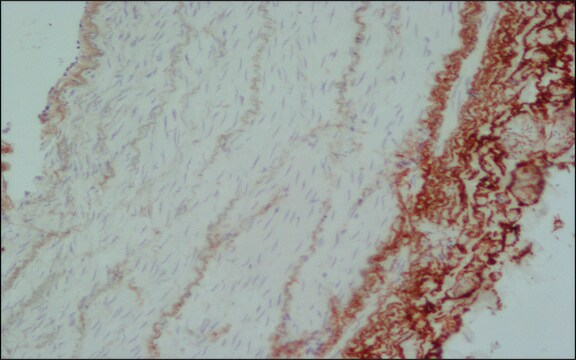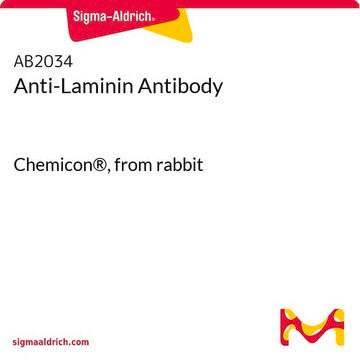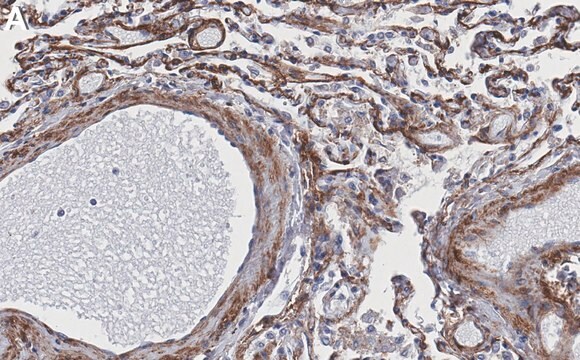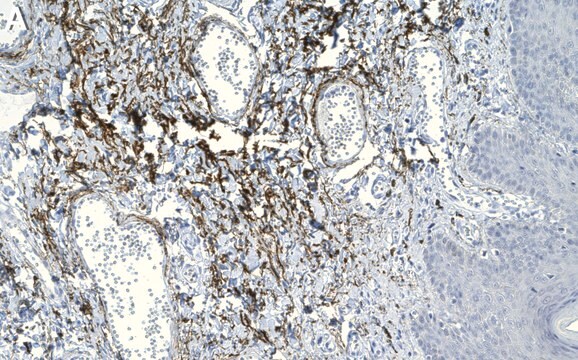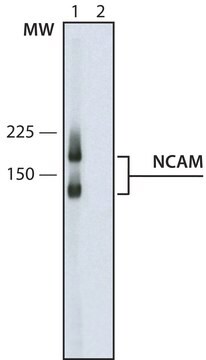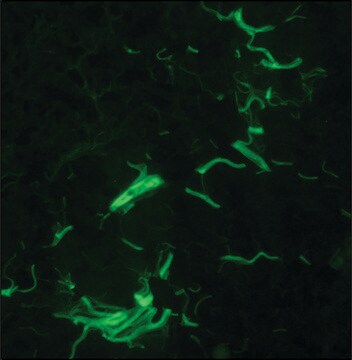E4013
Monoclonal Anti-Elastin antibody produced in mouse
clone BA-4, ascites fluid
Autenticatiper visualizzare i prezzi riservati alla tua organizzazione & contrattuali
Scegli un formato
Scegli un formato
Cambia visualizzazione
About This Item
Prodotti consigliati
Origine biologica
mouse
Livello qualitativo
Coniugato
unconjugated
Forma dell’anticorpo
ascites fluid
Tipo di anticorpo
primary antibodies
Clone
BA-4, monoclonal
PM
antigen 67.5 kDa
contiene
15 mM sodium azide
Reattività contro le specie
human, goat, sheep, guinea pig, pig, canine, feline, bovine
Confezionamento
antibody small pack of 25 μL
Descrizione generale
Monoclonal Anti-Elastin (mouse IgG1 isotype) is derived from the hybridoma produced by the fusion of mouse myeloma cells and splenocytes from an immunized mouse. Elastin is an important polymeric protein of connective tissue. It is synthesized and secreted as a soluble single-chain protein (tropoelastin) that undergoes numerous post-ribosomal modifications prior to the organization of the elastic fiber in the extracellular space.
Specificità
The antibody binds to insoluble elastin, α-elastin, tropoelastin (the soluble non-cross linked precursor of elastin) and to peptide fragments generated by proteolytic digestion of insoluble elastin. In tropoelastin preparations, three immunoreactive bands have been observed at 67.5 kDa, 65 kDa and 62 kDa corresponding to the three elastin isoforms. The antibody is specific for an epitope composed of the repeated sequence in elastin: Val-Gly-Val-Ala-Pro-Gly. This epitope has been shown to be a chemoattractant for fibroblasts and monocytes.
Immunogeno
bovine α-elastin.
Applicazioni
Monoclonal Anti-Elastin antibody produced in mouse has been used in:
- immunohistochemistry
- immunostaining
- immunoblotting
Azioni biochim/fisiol
Elastin is encoded by the ELN gene in humans. It is a polymeric protein in connective tissue that has exceptional properties of extension, elastic recoil to the extracellular matrix and allows many tissues in the body to resume their shape after stretching or contracting. Elastin is a self-assembling, extracellular-matrix protein providing tissue elasticity and is predominantly comprised of cross-linked tropoelastin. It plays an important role in the atherosclerotic process. The conformational disorder is caused due to a constitutive feature of elastin structure and function.
Elastin undergoes changes of morphology with aging and in many disease states. For example, abnormal accumulation of connective tissue in blood vessels contributes to alterations in vascular physiology associated with diseases such as hypertension and atherosclerosis. Several heritable diseases such as Marfan syndrome, pseudoxanthoma elasticum and the Buschke-Ollendorf syndrome may result from molecular defects of elastin.
Esclusione di responsabilità
Unless otherwise stated in our catalog or other company documentation accompanying the product(s), our products are intended for research use only and are not to be used for any other purpose, which includes but is not limited to, unauthorized commercial uses, in vitro diagnostic uses, ex vivo or in vivo therapeutic uses or any type of consumption or application to humans or animals.
Non trovi il prodotto giusto?
Prova il nostro Motore di ricerca dei prodotti.
Codice della classe di stoccaggio
10 - Combustible liquids
Classe di pericolosità dell'acqua (WGK)
WGK 3
Punto d’infiammabilità (°F)
Not applicable
Punto d’infiammabilità (°C)
Not applicable
Scegli una delle versioni più recenti:
Possiedi già questo prodotto?
I documenti relativi ai prodotti acquistati recentemente sono disponibili nell’Archivio dei documenti.
I clienti hanno visto anche
Fabricated elastin
Yeo GC, et al.
Advanced Helathcare Materials, 4(16), 2530-2530 (2015)
Moetaz El-Domyati et al.
The Journal of clinical and aesthetic dermatology, 3(12), 22-30 (2011-01-05)
Electro-optical synergy technology is one of the most recently described methods for nonablative skin rejuvenation. The aim of this study is to evaluate the effects of electro-optical synergy on connective tissue composition by histological and immunohistochemical techniques coupled with computerized
Moetaz El-Domyati et al.
International journal of dermatology, 51(8), 913-919 (2012-07-14)
Mesotherapy, commonly known as "biorejuvenation" or "biorevitalization", is a technique used to rejuvenate the skin by means of a transdermal injection of a multivitamin solution and natural plant extracts that are thought to improve the signs of skin aging. This
Moetaz El-Domyati et al.
Journal of cosmetic dermatology, 11(2), 122-130 (2012-06-08)
As the demand for minimally invasive rejuvenation is increasing, micropeel resurfacing using Erbium:Yttrium Aluminum Garnet (Er:YAG) laser 2940 nm has been reported for the treatment of photoaged skin without ablation of the epidermis. However, little is known about the efficacy
Kinon Chen et al.
Annals of biomedical engineering, 42(3), 678-684 (2013-11-16)
Age-related macular degeneration (AMD) etiology is unknown, but its association to atherosclerotic vascular disease (ASVD) has been observed. Since elastin plays an important role in the atherosclerotic process, to understand ASVD and AMD's relationship we examined retinal elastin existence, elastin
Il team dei nostri ricercatori vanta grande esperienza in tutte le aree della ricerca quali Life Science, scienza dei materiali, sintesi chimica, cromatografia, discipline analitiche, ecc..
Contatta l'Assistenza Tecnica.

